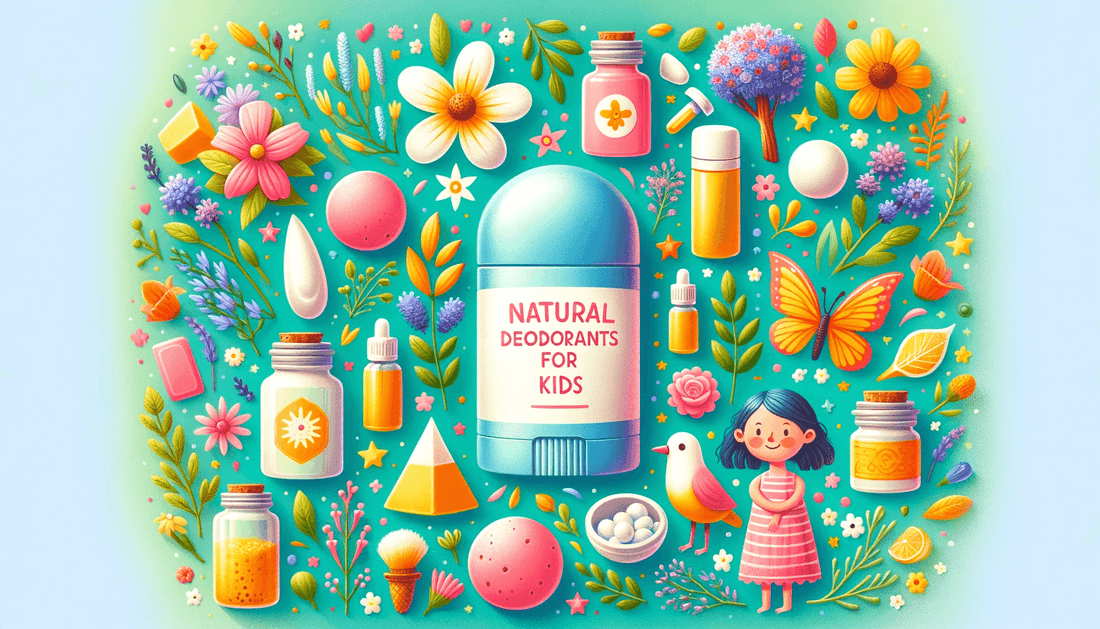
Uncovering the Truth: Are Natural Deodorants Safe for Kids?
Share

Understanding Natural Deodorants:
Natural deodorants have surged in popularity, particularly among parents seeking healthier, more organic alternatives for their children. These products typically exclude aluminum and other harsh chemicals, relying instead on natural components to combat body odor.
The Draw of Natural Ingredients:
Natural deodorants often contain ingredients like baking soda, cornstarch, and essential oils. These natural components are renowned for their skin-friendly properties and efficacy in managing body odor. Baking soda, for instance, neutralizes odors without irritating sensitive skin.
Children's Skin Sensitivity:
Children's skin is usually more delicate compared to adults, making the choice of deodorant critical. Natural deodorants are often milder and less likely to provoke skin irritation.
The Aluminum Debate in Deodorants:
Aluminum, commonly found in traditional deodorants, has been the subject of debate regarding potential health risks. While the scientific community hasn't reached a definitive conclusion, natural deodorants offer an aluminum-free alternative for cautious parents.
Effectiveness of Natural Deodorants:
Parents often wonder if natural deodorants are as effective as their traditional counterparts. While they might require more frequent application, many users find them adequately effective.

Selecting the Right Product:
It's crucial to choose a natural deodorant specifically formulated for children. Products like Naturally Wyld’s eco-friendly deodorants are tailored for the sensitive skin of children.
DIY Natural Deodorant Recipes:
For those interested in homemade solutions, there are various recipes that use coconut oil, shea butter, and essential oils. These homemade deodorants can be customized with different fragrances to suit personal preferences.
Pediatricians' Recommendations:
Before switching to a natural deodorant, consulting with a pediatrician is advisable, particularly for children with skin conditions or allergies.
Natural Deodorants in Hygiene Education:
Introducing natural deodorants can be a part of teaching children about personal hygiene. It provides an opportunity to discuss the importance of using safe and healthy products.
User Testimonials:
Sarah, a mother of two, shares her experience: "Switching to Naturally Wyld’s natural deodorant for my kids was a great decision. It's gentle on their skin and effectively controls odor."

Brand Comparisons:
When comparing different natural deodorants, consider factors like ingredients, scent, packaging, and user reviews to find the most suitable product for your child.
Environmental Considerations:
Many natural deodorants come in environmentally friendly packaging, appealing to families who are conscious about their ecological footprint.
Transitioning to Natural Deodorants:
Switching from traditional to natural deodorants might involve a period of adjustment where the body adapts to the new product. This transition is normal and should not be a cause for concern.
Addressing Parental Concerns:
Parents often have questions about the safety and effectiveness of natural deodorants. Researching and choosing well-reviewed, trusted products is essential.
In-depth Look at Ingredients:
Understanding the ingredients in natural deodorants is key. Ingredients like arrowroot powder, witch hazel, and tea tree oil are common and known for their natural antiseptic and absorbent properties. It's important to be aware of any potential allergens and to choose products free from synthetic fragrances and harmful chemicals.
Natural Deodorants and Allergies:
While natural deodorants are generally safe, some ingredients, like essential oils, can cause allergic reactions in sensitive individuals. Conducting a patch test before full application is recommended.
The Role of Essential Oils:
Essential oils are often used in natural deodorants for their fragrance and antibacterial properties. However, it's important to choose deodorants with appropriate concentrations of these oils to avoid skin irritation.
Making an Informed Decision:
When selecting a natural deodorant for your child, consider their individual needs, skin type, and any known sensitivities. Read labels carefully and choose products with transparent ingredient lists.
The Importance of Regular Application:
Natural deodorants may require more frequent application than conventional ones. Educating children on maintaining personal hygiene and the importance of regular deodorant application is essential.
Market Trends in Natural Deodorants:
The market for natural deodorants is growing, with an increasing number of brands offering products specifically for children. This trend reflects a broader shift towards natural and organic personal care products.
The Role of Packaging:
Eco-friendly packaging is not only better for the environment but also often safer for children. Look for deodorants in BPA-free containers or recyclable materials.
The Future of Natural Deodorants:
As research continues and consumer awareness grows, the future looks promising for natural deodorants. Innovations in formulations and packaging are likely to enhance their appeal and effectiveness.
Conclusion:
In conclusion, natural deodorants can be a safe, effective choice for children, providing parents choose products carefully and pay attention to their child's individual reactions and needs.
FAQ:
-
Q: How often should natural deodorant be applied to children?
A: Natural deodorants may need to be applied more frequently, possibly once or twice a day, depending on the child's activity level and personal needs.
-
Q: Can natural deodorants cause skin irritation in kids?
A: While they are generally gentler, some ingredients in natural deodorants can cause irritation, especially in children with sensitive skin. It’s important to monitor for any adverse reactions.
-
Q: Are there specific ingredients to avoid in natural deodorants for kids?
A: Avoid ingredients that are known allergens or irritants, such as certain essential oils or baking soda, if your child has sensitive skin.
-
Q: Is it better to buy natural deodorant or make it at home for kids?
A: Both options have their benefits. Store-bought natural deodorants are convenient and professionally formulated, while homemade ones can be customized but require careful selection of ingredients.
-
Q: How can I ensure the natural deodorant is effective for my child?
A: Choose a product with positive reviews and proven ingredients. Be prepared to try different products to find the one that works best for your child’s unique body chemistry.
Get Access Now: www.naturallywyld.ca